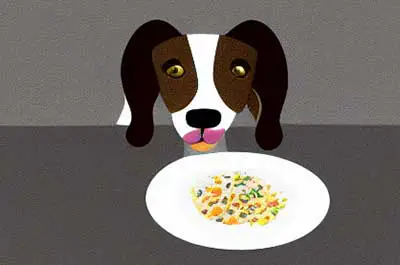Dogs can be fussy eaters just like people. Some dogs only want to eat certain foods, while others will turn their noses up at anything that is put in front of them.
If your dog is a picky eater, don’t worry – you’re not alone! In this blog post, we will explore why dogs can be picky eaters and offer tips on getting them to eat more food.
Your dog might be a picky eater because he’s not getting enough exercise.
Like people, dogs need regular physical activity to stay healthy and fit. If your dog isn’t getting enough exercise, he may become bored and restless, leading to a decreased appetite.
Dogs are natural scavengers, and in the wild, they would burn a lot of energy running around looking for food. When they’re confined to a house or yard all day, they don’t use up as much energy, and as a result, they don’t feel as hungry. Make sure your dog is getting at least 30 minutes of exercise per day, and you may see an improvement in his eating habits.
Additionally, a lack of exercise can lead to weight gain, putting extra strain on your dog’s digestive system and making it even harder for him to eat. So if your dog is being a little choosy at mealtime, ensure he’s getting plenty of opportunities to run and play.
A few extra walks or play sessions each day could make all the difference. A healthy diet and regular exercise are essential for keeping your furry friend happy and healthy.
Your dog might be a picky eater because he’s not getting enough attention.
Dogs are social creatures, and they need plenty of attention from their owners. When they don’t feel like they’re getting enough attention, they may start acting out in various ways, including becoming picky eaters.
If your dog feels like he’s being ignored, he may become anxious or depressed, which can lead to a loss of appetite. Dogs who don’t get enough attention may also exhibit destructive behaviors, such as chewing on furniture or digging holes in the yard.
To avoid this, ensure you spend plenty of time playing with your dog and offering affection. Take him for walks, toss a ball around, or just sit and pet him, whatever makes him happy.
As long as he feels part of the family, he’ll be more likely to eat his food. With a little effort, you can help your dog feel happy and loved – and he might start eating like a champ again.
Your dog might be a picky eater because he doesn’t like his food.
Just like people, dogs have their individual preferences when it comes to food. Some dogs like certain flavors or textures, while others will turn their noses up at anything that isn’t their favorite.

If your dog is a picky eater, try offering him various foods and see what he likes best. You might be surprised at what he’s willing to eat when he has some options.
There are also several commercial dog foods on the market that appeal to picky eaters. These foods often contain various flavors and textures, making them more appealing to dogs who are particular about their food.
Sometimes, eating too much people’s food can cause a dog to be a picky eater. While giving your dog table scraps is tempting, it’s important to remember that dogs are not designed to eat the same things as people.
Dogs require a different balance of nutrients than we do, and feeding them human food can cause health problems. If you’ve been giving your dog table scraps, try cutting back and see if that makes a difference in his eating habits.
Some dogs might be picky eaters because they’re not feeling well.
If your dog suddenly becomes a picky eater, it could indicate something is wrong. Dogs can’t tell us when they’re not feeling well, so a change in eating habits is often one of the first signs that something is wrong. If your dog is acting lethargic or seems to be in pain, make an appointment with your veterinarian to have him checked out.
Several health problems can cause picky eating in dogs, so getting him checked out as soon as possible is essential. Some common causes of picky eating include dental problems, digestive issues, and allergies. If your dog has trouble eating, don’t wait to take him to the vet; the sooner he gets treatment, the better.
Picky eating is a common problem in dogs, but it’s usually nothing to worry about. In most cases, picky eating is simply a matter of finding the right food or getting your dog more exercise.
However, if your dog suddenly becomes a picky eater or starts to lose weight, it is crucial to take him to the vet to rule out any health problems. With a little effort, you can help your dog feel happy and healthy; he might start eating like a champ again.
Your dog might be a picky eater because he’s being given too many treats.
While it’s tempting to spoil your dog with treats, doing so can cause him to become a picky eater. Dogs love treats and will often beg for them, but if they’re getting too many, they may start to turn their noses up at their regular food. This is because they know they can get something better by begging for a treat.
If you’ve been giving your dog too many treats, try cutting back and seeing if that makes a difference in his eating habits. You might also want to try giving him healthier treats, such as vegetables or pieces of fruit. There are also several commercial dog treats on the market designed to be healthy and tasty for dogs.
By reducing the number of treats he gets and ensuring they’re healthy, you can help your dog feel better and start eating his regular food again.
Some dogs are picky because they’re easily bored.
If they’re not presented with a variety of interesting and appealing meals, they quickly lose interest in eating. To keep your dog’s interest in his food, try to give him various textures and flavors. You might also want to try feeding him from a puzzle toy or feeder; these can help to make mealtime more fun and stimulating for your dog.
You can also talk to your veterinarian about making homemade meals for your dog. Adding a little variety to his diet can help your dog stay interested in his food and avoid becoming a picky eater. You can also try feeding them small meals more often throughout the day instead of one large meal.
This will help to keep their attention focused on their food and prevent them from getting bored. Keeping your dog excited about mealtime can be challenging, but you can make it happen with some imagination.
Some dogs become picky eaters as they age, and their taste buds change.
As dogs age, their taste buds change, and they may become less interested in certain foods. This is especially common in older dogs, who may start to turn their noses up at their regular food. Just like people, dogs’ taste buds diminish in number as they get older.

This can lead to a decrease in their ability to taste certain flavors, which may explain why some senior dogs become pickier eaters.
If your dog seems to be losing interest in his kibble, try mixing in some wet food or chicken broth to add flavor.
Try giving him various foods and see what he likes best.
You might also want to talk to your veterinarian about switching to a senior formula dog food designed for older dogs. Be patient and keep offering him new foods; eventually, you’ll find something he likes.
As with people, a dog’s eating habits can be affected by stress.
If your dog is stressed, he may lose his appetite or become a picky eater. When stressed, their bodies produce cortisol, which can suppress their appetite.
Dogs can also be affected by stress, and it may cause them to lose interest in food. If you think your dog’s picky eating habits are due to stress, try to identify the source of his anxiety and remove it from his environment. If that’s not possible, several products on the market can help reduce stress in dogs.
Stress in dogs can be caused by many things, such as changes in their environment, separation anxiety, or even boredom. If you think stress may be the cause of your dog’s picky eating habits, try to provide him with a calm and relaxed environment.
Here are some tips:
- Ensure your dog has a quiet place to eat where he won’t be disturbed.
- Try not to make any sudden changes to his routine or environment.
- Talk to your veterinarian about products that can help to reduce stress in dogs.
- Make sure he gets plenty of exercise and playtime.
If you think stress is the cause of your dog’s picky eating habits, talk to your veterinarian. They can help you identify the source of your dog’s stress and advise you on how to reduce it.
How can you make sure your dog is getting enough nutrition?
Just like humans, dogs need a balanced diet to stay healthy. A good diet for a dog includes proteins, fats, carbohydrates, vitamins, and minerals.
Dogs get most of their proteins from meat, so it’s vital to ensure that your dog is getting enough meat in their diet. You can do this by feeding them high-quality dog food that contains meat as the main ingredient.

You should also supplement their diet with occasional treats of cooked chicken, beef, or fish. In addition to meat, dogs also need fat in their diet. Good sources of fat for dogs include olive oil and coconut oil. Fats help to keep a dog’s coat healthy and provide energy.
Carbohydrates are another important part of a dog’s diet. They help to provide essential nutrients and help the digestive system work properly.
Good sources of carbohydrates for dogs include sweet potatoes and rice. Finally, dogs need vitamins and minerals in their diet to stay healthy. Vitamins and minerals can be found in many different kinds of food, including fruits and vegetables.
You can also give your dog a daily vitamin supplement to ensure they get all the necessary nutrients. By following these tips, you can ensure that your dog gets all the nutrition they need to stay healthy and happy.
Reward your dog for good behavior at mealtimes.
If your dog is being a good boy or girl at mealtimes, make sure to give them a treat. This will help to reinforce good behavior and let them know they’re doing something right. You can also use mealtimes as an opportunity to bond with your dog.
Spend some time petting and playing with them while they eat. This will help to create a positive association with food and make mealtime more enjoyable for both of you.
Dogs are intelligent creatures, and they quickly learn that if they refuse to eat their food, we will give them something better in its place.
This is why it’s essential to be consistent with mealtimes and not give in to your dog’s demands for table scraps or other treats. Instead, reward them with love and attention for eating their food. This will help to reinforce good behavior and make mealtime a positive experience for both of you.
Conclusion.
If your dog is a picky eater, don’t worry – you’re not alone! There are many ways to address this behavior and get your pup back on track nutritionally.
By trying some of the solutions we’ve outlined in this post, you should see an improvement in your dog’s eating habits fairly quickly. And if that doesn’t work, be sure to consult your veterinarian for further assistance.
Please feel free to share this post with other dog owners who might be struggling with a picky eater, and as always, thanks for reading!

Meet Brenda Tillman: your go-to expert in Cognitive Behavioral Therapy! Not only is she a seasoned therapist, but she’s also a passionate mom blogger who never misses a beat. Dive deep into her insightful blogs, backed by her extensive coursework in Parenting Skills, Learning, and Education. Brenda’s heartwarming family – a son, two daughters, and their adorable pets – often take center stage in her writings. From parenting hacks and relationship tips to health & fitness nuggets, Brenda has been enlightening her readers for over half a decade. Stick around, and you’re bound to discover gems from a mom who wears many hats with grace!
Reviewed By: Joanna Perez and Marcella Raskin
Edited By: Lenny Terra
Fact Checked By: Gabrielle J. Smith
Photos Taken or Curated By: Matthew Mansour